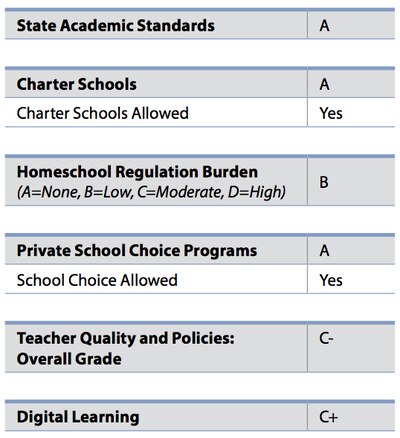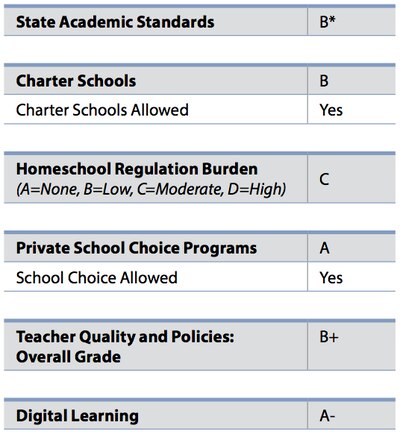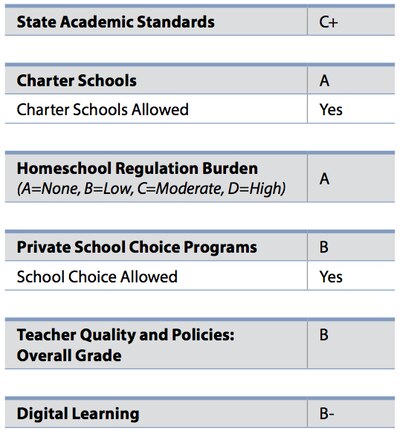While Betsy DeVos awaits a warm welcome from the American Legislative Exchange Council, there’s a lot to be learned from the conservative group’s most recent report on education.
The education secretary is speaking Thursday at ALEC’s annual meeting in Denver. The group, known for pushing model legislation to state governments, shares her view on school choice: more is better.
Only Arizona, Florida and Indiana received a B+ on ALEC’s most recent state-by-state report on education. (ALEC is a tough grader; that’s the highest grade given to any state.) Here’s what those states tell us about the group’s vision for America’s schools.
Arizona

Arizona gets high marks for its charter school rules, a rating pulled from the Center for Education Reform, which backs light regulation of charter schools. Nearly 19 percent of Arizona students attended a charter school last year — the highest share of any state in the country. In terms of growth, the state doesn’t have a cap on the number of charter schools that can open.
Arizona also received an A for its private school choice programs. Four of those are tax-credit scholarship programs, which use tax breaks to incentivize donations that families can then use for private-school tuition.
Although ALEC looks to Arizona’s tax-credit scholarship programs as a model, others have criticized them for loose regulations on how voucher-granting groups can spend their money.
The fifth program allows families to use educational savings accounts to spend public money directly on certain education expenses, like private school tuition or tutoring. DeVos congratulated the state’s governor on Twitter when that was approved.
Florida

Florida offers its students tax-credit scholarships, educational savings accounts and private school vouchers, earning it an A for private-school choice.
The state’s school choice movement began when Jeb Bush spearheaded tax-credit scholarships for low-income students and students with disabilities during his time as governor. (ALEC’s work and Bush’s work overlap: the report’s digital learning grades come from a 2014 analysis by Bush’s Foundation for Excellence in Education.)
Choice programs in Florida show mixed results when it comes to boosting test scores. Some critics also say that the state’s voucher program fails to serve many students with disabilities. Still, participation in most of these programs has been steadily increasing.
Indiana

Indiana is home to the largest private school voucher program in the country, which served about 34,000 students last year. (DeVos has visited multiple schools participating in the program, praising one for its diversity.)
The size of the program means it’s faced plenty of scrutiny, too. State data shows that the program is increasingly serving middle-class families whose children never attended public school. Some have raised questions recently about schools that deny services to LGBT students.
Indiana also offers two tax-credit scholarship programs.
The state got an A for its charter-school policies, which place no caps on the number that can open. Indiana’s charter schools also face their own problems: Chalkbeat has documented how students at Indiana’s virtual charter schools consistently earn low test scores. Chalkbeat also found that Indianapolis’ charter schools are some of the city’s most segregated.


